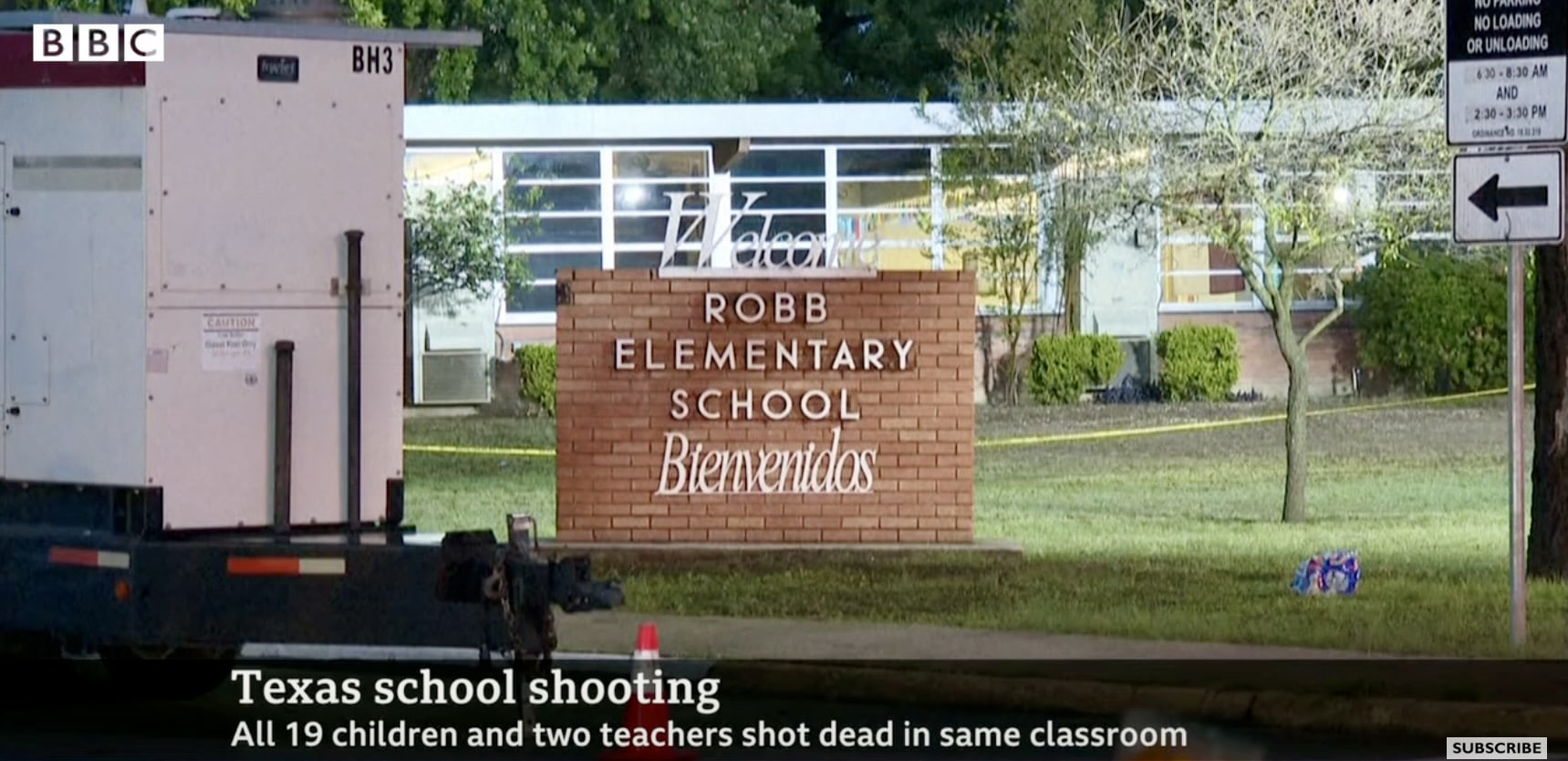Texas school shooting: Are we still able to say God is good?
Salt&Light // May 26, 2022, 7:50 pm

The Texas shooting is now the deadliest school shooting since a gunman killed 26 people, including 20 children, at Sandy Hook Elementary School in Connecticut in December 2012. Screengrab from BBC News.
On May 24, 2022, 18-year-old Salvador Ramos entered Robb Elementary School in the town of Uvalde, Texas, and shot dead 19 students and two teachers.
The victims were all in a single fourth-grade classroom, where the gunman had barricaded himself before proceeding with the massacre. He had also shot his grandmother before making his way to the school.
In a tragedy of such heartbreaking proportions, are we still able to say God is good?
The Texas shooting is now the deadliest school shooting since a gunman killed 26 people, including 20 children, at Sandy Hook Elementary School in Connecticut in December 2012.
“We’re a small community and we need your prayers to get us through this,” Hal Harrell, the Uvalde school district superintendent, told reporters on Tuesday in an emotional statement, even as American politicians reignited a national debate over gun laws.
The heartbreaking news saw an outpouring of grief from around the world.
Leaders from various countries — including Ukraine, Canada, France, Germany, Mexico and the United Kingdom — as well as global faith leaders shared messages of shock and sympathy.
“Nineteen victims were under age 10. Children and teachers were murdered in a cowardly attack in their Texas school. We share the shock and grief of the American people, and the rage of those who are fighting to end the violence,” tweeted Presiden of France, Emmanuel Macron.
In a tragedy of such heartbreaking proportions, coming on the heels of global war, famine and disease, are we still able to say God is good?
Where is God when it hurts?
Salt&Light asked this question of those who have known grief and loss: How do they reconcile a loving God with senseless tragedy?
Joan Swee, 62, knows grief all too intimately.
“In my desperation, I really cried to God.”
When she lost her husband of close to 12 years to cancer, she was left with two distraught sons who were just six and eight.
Too young to be able to express their grief, “there was a lot of acting out, hitting each other”, remembers Joan. “There was so much anger. They were angry with God.”
She had few resources at hand. This was 1994, well before the days of the Internet and Google searches.
“I saw my sons being so disturbed, but I didn’t know what to do. I was grieving myself.
“In my desperation, I really cried to God.”
This is Joan’s reply to the question:
Is God still good?
The Texas shooting is horrifying.
Our first instinct is to question our beliefs and assumptions about God: Does He exist? Is he still good? Why didn’t He prevent this act of evil?
The death of a young child or teenager is premature, and runs contrary to our expectations of what life should be. When such loss hits close to home, our sense of normalcy is upended.
Often, our first instinct is to question our beliefs and assumptions about God: Does He exist? Is he still good? Why didn’t He prevent this act of evil? Why didn’t He protect the innocent? Why does He allow such suffering?
Being a believer does not exempt us from suffering, loss and grief.
The Bible does not deny the realities of life in this fallen world. Jesus declared: “In this world you will have trouble, but take heart! I have overcome the world.” (John 16:33)
Grief is a normal and natural reaction to loss. Any kind of loss can cause grief, and especially so if the loss is sudden, unexpected and traumatic.
What then do we do with our emotions of grief?
Wail and grieve
We can be assured that God can handle the full onslaught of our grief. God gives us full permission to grieve.
The Bible does not deny the realities of life in this fallen world.
Just take a look into the Bible: Scripture is full of references to mourning, grieving and wailing. Our Messiah is “a man of sorrows, acquainted with deepest grief”. (Isaiah 53:3, NLT)
Jesus Himself declared: “Blessed are those who mourn, for they will be comforted.” (Matthew 5:4)
This much is clear: It is perfectly fine to mourn. In fact, God comforts and blesses those who mourn.
What’s more, we are granted time to grieve. There is a time to weep, and a time to rejoice: “Weeping may remain for a night, but rejoicing comes in the morning” (Psalm 30:4-5). God does not expect us to hide our tears, and fake happiness.
Since God grants us time to grieve, we should not deny ourselves or others this emotional necessity.
Scripture is full of references to mourning, grieving and wailing.
We should support those who grieve. The Spirit of God anoints us and sends us to “comfort the broken-hearted” (Isaiah 61:3).
Most believers know this; we just don’t know how to do it.
Comforting someone does not mean negating or dismissing their grief; that would be cold comfort. Instead, we are to “mourn with those who mourn” (Romans 12:15) — by acknowledging their loss and sitting with them in their grief, without pronouncing judgement or giving in to the temptation to prescribe ‘quick-fix’ answers.
In Psalm 62:8, we are encouraged to “pour out our hearts to Him, for God is our refuge”. This principle should guide our approach towards the grieving. For too long, we have urged grievers to ‘be strong’, when we should really be allowing them to express and process their grief, so they can come into a season of authentic joy.
Our hope
Grief is like a tunnel. We can’t walk around it or bypass it; the only way out is to go through it.
Our instinctive response is to ignore or run away from pain and grief, by busying ourselves with other things and burying our emotions. But grief ignored does not go away; it only builds up.
Our grief is not incompatible with blessedness and faith in a loving and sovereign God.
Only grief that is acknowledged and processed can eventually be healed and resolved.
The Apostle Paul tells us not to grieve “like those who have no hope.” (1 Thessalonians 4:13-14) So we are to grieve, but we are to grieve with hope.
It is not one or the other, but both.
In a world that is uncertain, where evil co-exists with good and where suffering co-exists with joy, our grief is not incompatible with blessedness and faith in a loving and sovereign God.
We have a living hope — a God who can eventually transform our pain, our incessant questions, and our tears into beauty (Isaiah 61:3).
As someone who has known deep pain and grief, I would gladly testify that in spite of it all, God is STILL good. I have indeed experienced the goodness of God as I made my way through (and not around) the tunnel of grief.
Look out for Part 2 of this story in a few days: Texas school shooting: How do we face overwhelming grief? 5 families share how they survived the anguish of loss.
If you are grieving, reach out to friends whom you trust, and seek professional help.
As a counsellor and grief recovery specialist at Whispering Hope Singapore, a consultancy Joan founded, she walks with people struggling with all sorts of grief.
RELATED STORIES:
“I am moved by the tears of your wife. I will heal you,” Jesus told this dying man
We are an independent, non-profit organisation that relies on the generosity of our readers, such as yourself, to continue serving the kingdom. Every dollar donated goes directly back into our editorial coverage.
Would you consider partnering with us in our kingdom work by supporting us financially, either as a one-off donation, or a recurring pledge?
Support Salt&Light

